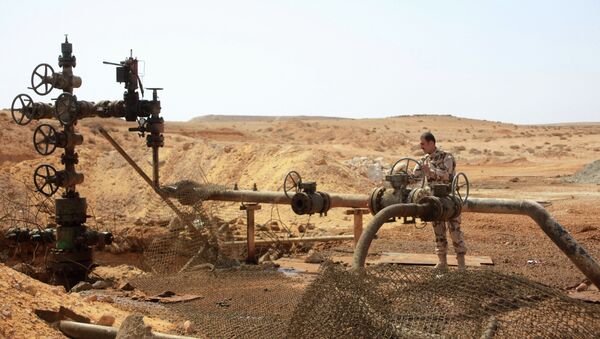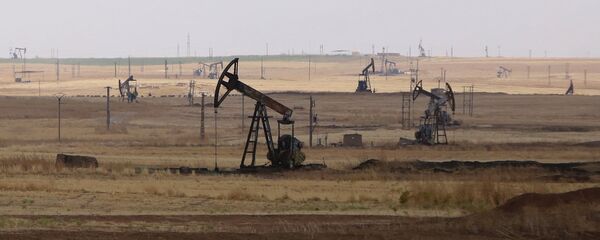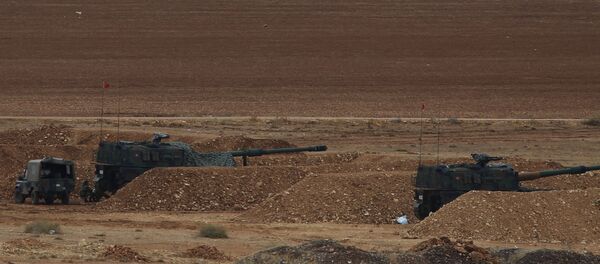The main market for the stolen oil, Kasaev notes, is Turkey, with evidence suggesting that some of the oil also makes its way to Jordan, from where it goes abroad, including to Europe and the United States.
"It's important to note that the monthly volumes of oil which Turkey buys from the terrorists depends on brokers' ability to freely cross the Syrian-Turkish border, which is guarded by the enemies of Daesh. The going rate for the oil is [currently] only around $15 a barrel. The stolen oil goes abroad at market prices, which are twice the price that Turkish buyers pay the jihadists."
In this situation, the analyst notes, "it should not surprise anyone that the stolen oil supplied by Daesh militants at extremely low prices attracted Turkey from the very beginning. Reselling it, Turkey has the opportunity to earn some extra income, while bombing the Kurds under the guise of combating radicals. Of course, they could also use the oil purchased from the terrorists on the domestic market, as the country's own oil output is very small, while consumption is high."
Today, Kasaev writes, the political actors ostensibly searching for a solution to the Syrian crisis recognize the importance "of the creation and implementation of clear and effective international legal norms which could prevent the radicals from regularly receiving financial support via the illegal sale of oil."
"Firstly, the term 'failed state' remains controversial, and there is no coherent and generally recognized international legal doctrine in relation to such a state. Secondly, Daesh (the 'Islamic State'), despite its name, is not a state actor, but a terrorist organization, whose actions in the course of an armed conflict are not governed by the rules of international law."
With regard to Daesh's operations in Syria, Kasaev recalls that in the strict legal sense, what is going simply amounts to "an illegal seizure of a part of the territory of a state whose oil and gas fields are owned by the state (Article 14 of the Constitution of the Syrian Arab Republic)."
What's more, in contrast to Article 55 of the 1907 Hague Convention (IV) Respecting the Laws and Customs of War on Land and Its Annex, which notes that occupying states have the right to administer and use the resources of occupied territories, "in the case of Daesh, it is a matter of the annexation of a territory by a terrorist organization, which is not a subject of international law and which does not comply with the laws of war."
Therefore, the analyst notes, "it can be concluded that Daesh controls, produces and exports the production of Syrian oil fields completely illegally. However, it is worth once again drawing attention to the fact that this issue is not specified within existing international legal doctrine."
Four Mechanisms to Address Illegal Oil Smuggling
In the present situation, Kasaev suggests, there are four concrete international legal mechanisms which could help to definitively address the illegal smuggling of oil resources.
"First: It is no secret that Daesh concludes deals to sell oil and oil products from occupied territories in Syria with independent foreign traders (deals are done right near the wells themselves!). It is therefore necessary to approve of strict international legal rules which would prescribe punishment for both public and private sellers, commensurate with the scale of the offense."
"The second issue," according to the analyst, "is connected to the amount of oil and oil products supplied. For example, oil from Iraq to Turkey is sold under a bilateral treaty between the two countries. However, due to a strong element of corruption, which allows for contraband supplies to be exported to the Turkish market in addition to legal supplies, more oil finds its way to Turkey than the contract allows for. A similar scenario is now playing out in Syria."
"It seems, therefore, that it would be appropriate to establish a specialized international agency, accountable to the United Nations (and not to regional organizations such as OPEC or OAPEC), given the strong risk for corruption at the regional level. The main goal of the organization would be to control the volumes of oil and oil products moving from Syria to foreign markets. Moreover, the agency could ensure that everything on the domestic market in Syria was there legally as well."
"Third: payment for the deals struck between the jihadists and foreign buyers is carried out through the banking system. In the ranks of the terrorists there are professionals in the banking sector who are quite capable when it comes to carrying out currency operations. Moreover, Daesh has seized a large bank in Iraq's Mosul."
"It would make sense," therefore, the analyst suggests, "to cut off the possibility for Daesh and its affiliated groups to carry out transactions through the international cross-border inter-bank payments system. The United States and Western countries, which are de facto fighting against the terrorists in Iraq, and on the Syrian track, are quite capable of finding a solution to this problem – that is, if they wanted to."
"Fourth: Without exception, all international players are interested in the reliability of the long-term supply of energy supplies to different markets. The situation in Syria has long-since become not only a regional but a global problem, including for the transit of oil and gas."
"In this connection, in public dialogue with the United States and other players, it would be expedient for the Russian side to promote the adoption of international standards which would ensure the reliability and long-term sustainability of energy flow abroad," Kasaev concludes.






